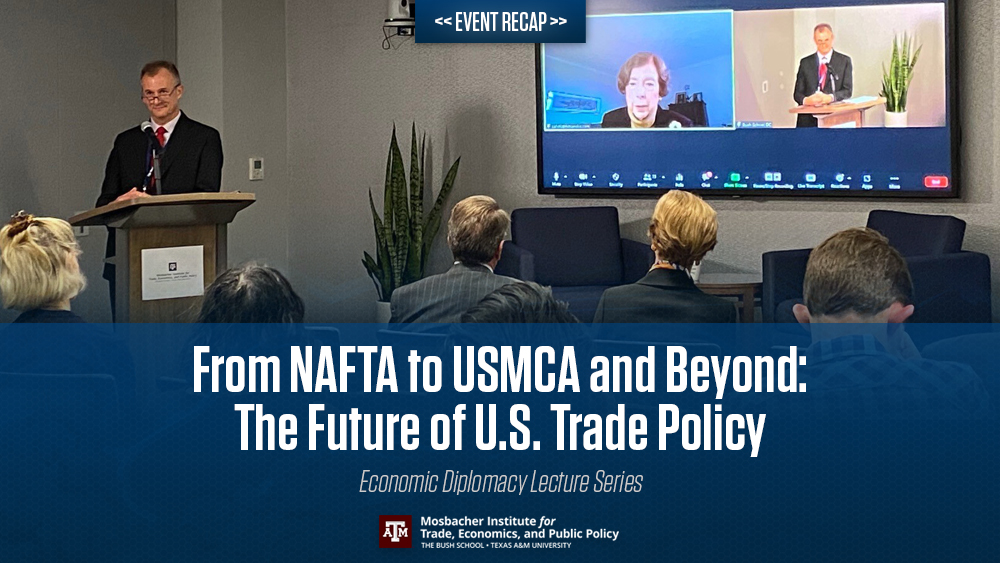
On October 6, 2022, the eve of the 30th anniversary of the signing of the North American Free Trade Agreement, the Mosbacher Institute for Trade, Economics and Public Policy hosted Ambassador Carla Hills, former U.S. Trade Representative and Chief U.S. Negotiator for NAFTA. Hills spoke about the positive impact trade can have and the prospect for future trade arrangements. The lecture was held at the Bush School DC and was the second lecture in a three-part Economic Diplomacy Lecture Series.
After Mosbacher Institute Director Raymond Robertson enthusiastically welcomed the crowd, Robert Mosbacher Jr. introduced Hills, describing her wealth of knowledge and distinguished career. As the U.S. Trade Representative from 1989 to 1993, she served as President George H.W. Bush’s chief NAFTA negotiator and top adviser on international trade policy. In a time of increasing global pessimism over the value of trade, Hills reminded the audience that trade is a vital avenue for economic growth and strengthening international relationships. Recognizing NAFTA’s 30th anniversary, Hills referred to its achievements in increasing economic productivity and growth in the United States, Canada, and Mexico, expanding export opportunities for American businesses, and bolstering diplomatic relations and opportunities for cooperation across the North American continent. While reflecting on NAFTA’s success, Hills stated it is now vital for the U.S. government to once again make trade policy a priority. She stated that the United States should act as a leading nation in revamping trade enthusiasm. Hills believes this can be done by rejoining the Trans-Pacific Partnership (TPP), improving trade relations with China, working with allies to update the World Trade Organization (WTO), and reminding the American public of the vast and numerous benefits of trade.
The audience followed Hills’ talk with questions focused on the current challenges facing existing trade agreements and the future of trade itself. Specifically, there were questions about how demographic changes and emerging technologies will impact trade relations and what the United States should do when approaching current challenges to NAFTA’s successor, the USMCA. A common thread throughout Hills’ answers was the complementary relationship between trade agreements and diplomatic relations. For example, she referred to the possibility of the United States rejoining the TPP and how this would allow the United States to build stronger ties with TPP-member nations while also placing economic and political pressure on China to abide by the rules laid out in the TPP trade agreement. Hills stated a law-abiding China would benefit the Chinese people and China’s vast number of trading partners, including the United States. This example, amongst many others, served as a prominent reminder of trade’s importance as a tool in economic diplomacy to advance the strategic and security interests of the United States.
The Economic Diplomacy series continues on Thursday, November 10, with Robert A. Mosbacher Jr., 9th President and CEO of the Overseas Private Investment Corporation, speaking about the importance of development finance in facilitating investment in middle and low-income countries and in extending a rule-of-law, free-market approach to economic growth and opportunity.

